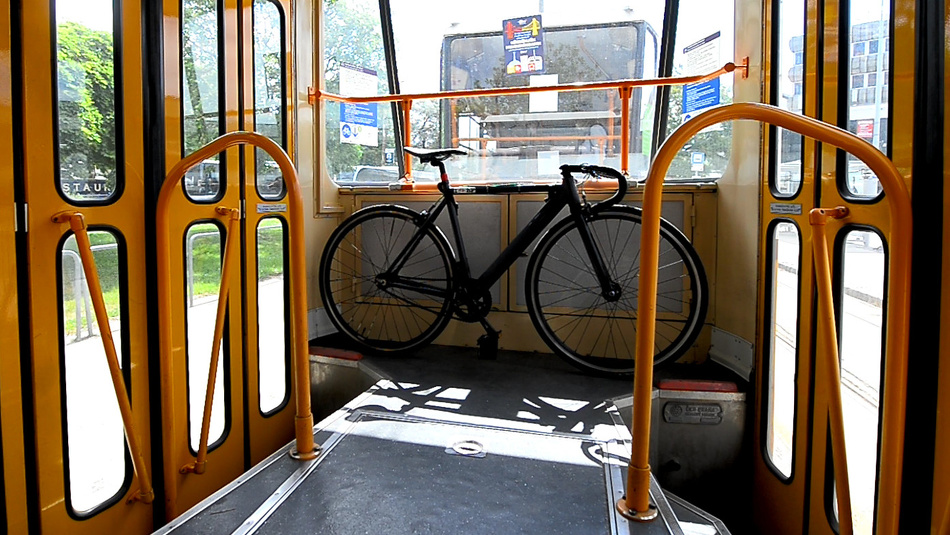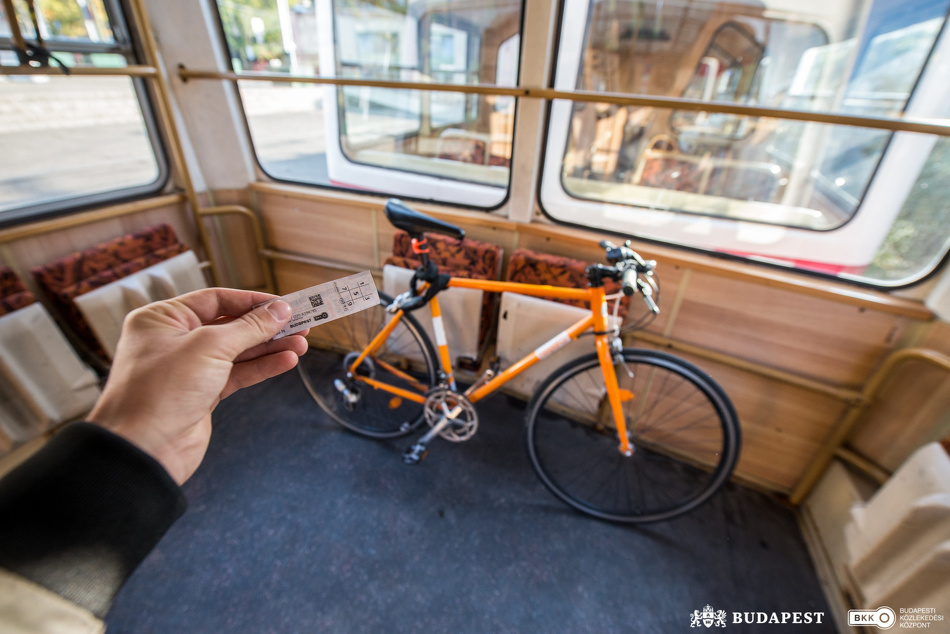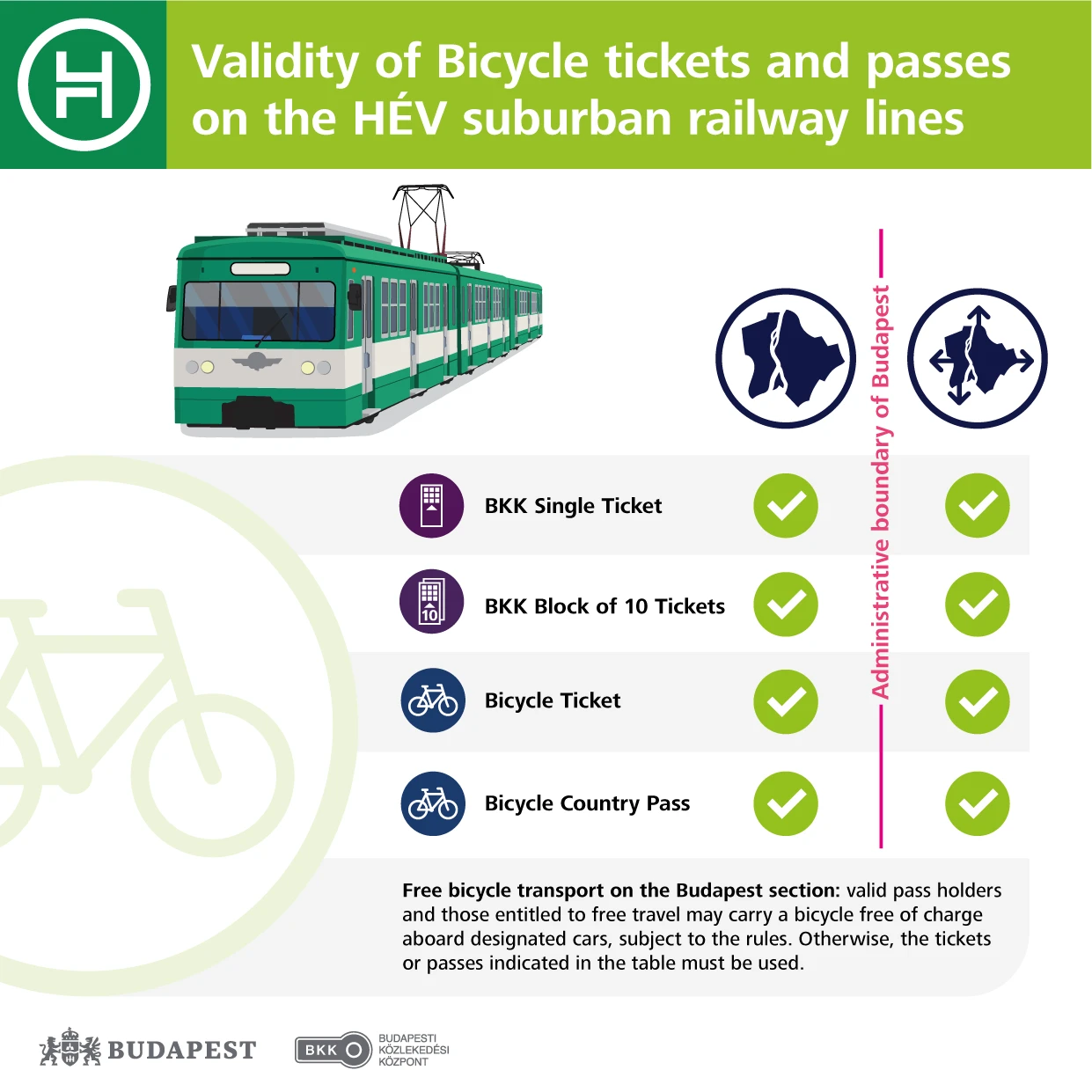BKK’s several public transport services can take your bike on board: boats, the cogwheel railway as well as several bus and tram lines. Bicycle traffic has increased due to the pandemic; therefore as a pilot, cyclists who also use public transport need to pay only their own fare, while their bikes ride free of charge at weekends.

In what cases is it practical to carry a bike on public transport?
Passengers who regularly travel great distances and would like to combine cycling and public transport, in which case the BudapestGO journey-planning app is of great help, are advised by BKK to use B+R bike storage facilities or MOL Bubi public bikes.
In certain situations, it is very useful if you can take your bike aboard a bus or tram, such as a flat tyre, an e-bike’s dead battery, a summer storm, or the typical usage style on Buda’s hilly terrain: comfortably roll downhill in the morning, but on the way home, the going might get tough, in which case it is a good option to hop on a bus or tram instead of climbing uphill. Furthermore, this solution also helps the older generation or parents with small children who do not wish to go without the joy of riding a bike.
Which lines will take bikes on board?
On workdays:
Currently, bicycles may only be transported on the older, high-floor trams operating on lines 1, 14, 17, 19, 56, 56A and 61. Transporting bikes is not yet permitted on the newer, low-floor CAF and Combino trams. In the BudapestGO app, you can always check in advance which type of tram is arriving at your stop.
At weekends and on public holidays:
Currently, bicycles may only be transported on the older, high-floor trams operating on lines 1, 14, 17, 19, 56, 56A and 61. Transporting bikes is not yet permitted on the newer, low-floor CAF and Combino trams. In the BudapestGO app, you can always check in advance which type of tram is arriving at your stop.
Where are the designated areas for transporting bikes on board?
The transportation of bicycles is allowed only aboard vehicles marked with a bike pictogram.
Only one bike per passenger is permitted. The size of the bike to be transported may not exceed 180x130x70 cm (length/height/width). Bikes that cannot be secured with the on-board Velcro fastener owing to their design are not permitted on trams (e.g. recumbent bikes).
It is the responsibility of the passenger to secure the bike safely.
This is how to transport your bike on trams:
This is how to transport your bike on buses:
On board buses, the designated area for bikes is facing the second /middle door, and it is also used for transporting baby carriages. One bike per bus is allowed. The door to be used for boarding with a bike is marked with a bicycle pictogram on dedicated buses whose front side also has a pictogram to indicate that the bus can take a bike on board.
Modulo type buses are equipped with three industrial Velcro fasteners for securing a bike.
On board Tatra trams, the transportation of one bike per car is permitted (a total of two bikes per tram) in the area marked with a pictogram, closest to where the two cars are connected (at the end where there is no driver’s cabin), while in the case of three-car trams, three bikes can be transported altogether. Bikes need to be fastened using the provided hook-and-loop (Velcro) fasteners.
On the cogwheel railway (also known as tram line 60), the transportation of up to 16 bikes is permitted in the area by the rear door of the car facing uphill.
On suburban railway trains, up to four bikes are allowed in the designated area in the middle car of each train. A bicycle pictogram painted on the platform of suburban railway stations indicates the door to be used for boarding with bikes. (Please note that you are not allowed to place your bike outside the designated area on board even if the area is full, as the bicycle may block passenger movement or it can even lead to accidents.)
On certain vehicles, the area designated for bikes is also shared by wheelchairs and baby carriages, therefore bike users are kindly asked to give priority to boarding wheelchair passengers and those travelling with a baby along with a baby carriage. In case of disputes, BKK will take the passenger who has boarded first, or was the first to arrive at the stop.
The driver may deny boarding with a bike if the vehicle is crowded or if fastening the bike is not feasible for some reason.

What type of ticket is required for transporting bikes?
If you travel with a ticket on BKK lines, bicycles can be transported with a validated single ticket or an individual ticket from the Block of 10 tickets on designated BKK vehicles (except line D14 where a ferry ticket for bicycle is required) or with a Country Bicycle Pass. Pass holders and those entitled to free travel can take one bike on board free of charge.
You can use a single ticket (including one from the Bock of 10) or a bicycle ticket for single journeys, and Country Pass for Bicycle for regular journeys to transport your bike on the HÉV suburban railway lines under the conditions shown in the table below. If you are pass holder or entitled to free travel, you can take one bike on board within Budapest. Bicycle tickets and Country Passes for Bicycle can be purchased at the sales points of MÁV and GYSEV Zrt. as well as in the MÁV app.
The transportation of small-size bicycles with an outer wheel diameter of maximum 41 cm (16”), scooters and folding bikes with no size limitation is permitted free of charge as hand luggage on all lines, provided the carried items do not pollute or damage fellow passengers and the vehicle’s equipment.
What to do when the front-door-only boarding policy applies on a vehicle?
Prior to getting on, you need to present the required tickets or passes (fares for both passenger and bicycle) to the driver at the front door and then proceed to the designated (middle or back) door for boarding with the bike. The bike needs to be securely fastened before departure.
Tips on how to transport bikes
- Please fasten your bike during travel so as not to endanger the safety or clothing of other passengers or the equipment on board.
- The size of the bike to be transported may not exceed 180x130x70 cm.
- Besides a normal size bicycle, only such an additional bike can be carried on board which qualifies as hand luggage, such as a child bike, which can be transported free of charge on any vehicle, provided it does not damage or pollute other passengers or equipment.
- On board trams, only such bikes are permitted which are capable of being fastened by the hoop-and-loop (velcro) fastener found on bike rack.
- Transporting specially designed bikes, such cargo and tandem, is not permitted.
- In order for transport services to be able to run on schedule, passengers with bicycles are kindly asked to get on and off as quickly as possible.
Tips for fellow passengers
- Please be considerate and help the passenger carrying a bike to board/exit and to place their bike in the designated area.
Bikes on board trains by MÁV: https://www.mavcsoport.hu/en/mav-start/domestic-travels/faq-domestic-travel
Bikes on board the Children’s Railway: https://gyermekvasut.hu/en/prices/
Cycling safety tips by the Hungarian Cyclists’ Club: https://kerekparosklub.hu/hungarian-cyclists-club-common-summary-for-secure-cyclin




